We engage in research covering the breadth of our disciplines, from the editing of fragmentary tenth-century Judaeo-Arabic manuscripts on the Jewish calendar to an empirical study of policies addressing racial inequality in the cultural and creative industries.
Our work is funded by the Arts and Humanities Research Council, the British Academy, the European Research Council, and the Leverhulme Trust, among others.
Shaping Scholarship: Early Donations to the Bodleian Library
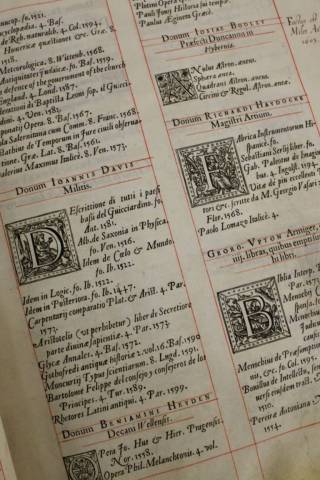
The project seeks to uncover the stories behind the books on the shelves at the Bodleian Library, Oxford, by analysing the network of people who gave books and money in the first part of the seventeenth century (1600-1620). The project will explore the relationships between people, things, and places, giving a broader sense of philanthropy, book-ownership, and social connectedness in Jacobean England. While many of the donors are well-known historical figures, a large number have been omitted from the conventionally rehearsed narrative, featuring scholars, soldiers, women, and diplomats. By examining this network of donors, the project reconstructs the landscape of gift-giving and exchange which had the Library at Oxford as its philanthropical centre and focus.
This three-year project is led by Dr Robyn Adams (UCL Centre for Editing Lives and Letters), Dr Matthew Symonds (UCL Centre for Editing Lives and Letters) and Dr Alexandra Franklin (University of Oxford) and funded by an AHRC Research Grant (2021-24).
Documentary Snapshots from Seventh Century Egypt: Local Responses to Regime Transitions
This three-year project aims to make a large amount of completely new or understudied evidence available to scholars in various disciplines. The material in question offers different snapshots of the Egyptian hinterland in the seventh century.
The seventh century of our era witnessed dramatic events and transformations in the political, religious, and cultural landscape of the Near East and North Africa. Egypt did not escape the turmoil and subsequent changes. It had been relatively tranquil since its annexation to Rome in 30 BCE, but the seventh century brought a series of shocks. The country was invaded and conquered twice, first by the Sasanian Persians and then by the Arabs, who brought an end to the previous regime. Narrative sources in various languages convey a fairly detailed picture of political developments but tell us little about how the high drama and changes affected the lives of local people and how they responded.
For insight into these questions, this project depends on the writing materials preserved in the sands of Egypt, papyri, and ostraca. Letters and contracts, lists, and accounts, receipts and chits offer unique glimpses of everyday life in the ancient world. They constitute primary evidence for administrative, social, and economic history of a kind that is hard to obtain from any other part of the ancient Mediterranean and Near East. Papyrologists have been deciphering, translating, and interpreting these texts for the benefit of the wider scholarly community for over a century, but large numbers of important texts await further study and publication.
This co-funded AHRC/DFG (Deutsche Forschungsgemeinschaft) UK/German Collaborative Research Grant (2021-24) is led jointly by Prof Nikolaos Gonis (UCL Greek & Latin) and Dr Lajos Berkes (Humboldt-Universität zu Berlin).
The Roots of Responsibility: Metaphysics, Humanity, and Society
Philosophical research on responsibility today stems from early modern debates about causal necessity and freedom of the will, and ultimately from the Stoic problem of reconciling ethics with physics. It is therefore mainly focused on scepticism about the existence of free will and on the question whether moral responsibility is compatible with physical determinism.
The main premises of this project are that this focus is too narrow, and that the traditional problems can only be solved with a deeper understanding of the network of human capacities responsibility involves and the social and interpersonal context in which questions about responsibility arise. This in turn depends on a wide range of philosophical and scientific research that has been neglected in debates about determinism, responsibility and free will, in particular, legal theory, biological systems theory, and the philosophy of action.
This five-year project, led by Prof John Hyman (UCL Philosophy) and funded by an ERC Advanced Grant (2018-23), will draw on all of these resources, in order to develop a comprehensive theory of responsibility, which cuts across traditional boundaries between metaphysics, epistemology, ethics, and philosophy of law. It will foster collaborative research in these branches of philosophy and include expertise in psychology and theoretical biology at the relevant stages.
Comparative Classics: Greece, Rome, India
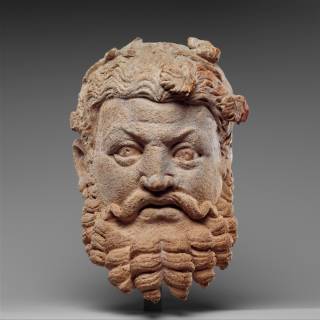
Ancient Greece, Rome, and India produced ‘classical’ cultures, but the Graeco-Roman and Indian classical cultures are studied separately. By comparing the Graeco-Roman and the Indian ideas of the classical, the project seek to understand the similarities and the differences of these ‘European’ and Indian classicisms.
This comparative, interdisciplinary, and transhistorical project looks at ancient ideas of the classical and their modern legacies. Led by Prof Phiroze Vasunia (UCL Greek & Latin), Prof Chakravarthi Ram-Prasad (Lancaster University) and Prof Francesca Orsini (SOAS University of London and funded by a Leverhulme Trust Research Project Grant (2021-24), the three-year project brings together scholars with an expertise in languages such as Greek, Latin, Sanskrit, and Hindi and initiates an important dialogue between scholars who normally work apart from each other.
Saadya Gaon’s Works on the Jewish Calendar: Near Eastern Sources and Transmission to the West
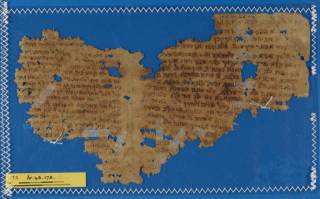
Saadya Gaon, based in Baghdad, was the preeminent scholar and leader of rabbinic Jews in the early tenth century. In this period, the calendar and dates of Jewish festivals were subject to major disagreements and conflicts in the Near East. This project aims to reconstruct, edit, and study, for the first time, the full corpus of Saadya Gaon’s writings on the Jewish calendar.
The project team will undertake the first comprehensive study of Saadya’s writings on the Jewish calendar. Based on fragmentary manuscripts in Judaeo-Arabic, they will reconstruct, edit, and translate his works. They will assess their literary and historical significance and highlight their long-term impact on time and time reckoning in Jewish tradition, in particular, on the establishment and diffusion of a standard Jewish calendar from Babylonia to western Europe.
This two-year project is jointly led by Prof Sacha Stern (UCL Hebrew & Jewish Studies) and Prof Ronny Vollandt (Ludwig-Maximilians-Universität, Munich), and funded by a grant from the Fritz Thyssen Foundation (2021-23).
The Surfaces of Law: A Photographic Study of Legal Architecture

Supported by a Leverhulme Trust Research Fellowship (2022-23), Carey Young (UCL Slade School of Fine Art) will create a photographic series which examines the ‘surfaces of law’: details of legal architecture, including courthouses, prisons, law offices, etc. Instead of the aesthetic blank often associated with law, the design of legal buildings can be a telling aspect of a society’s attitudes towards the judiciary, democracy and the relationship between state and citizens. By photographing details and surfaces (walls, windows, etc.) whose details, colours, and patinas speak of power and its relationship to the individual, to ideas of time, liberty and confinement, the project will explore varying ideas of what law is, and what it might represent.
The poetics of Protestantism: understanding the circulation and significance of Protestant Latin verse, c. 1550-1620
This project, funded by a British Academy Mid-Career Fellowship (2021-22), will allow Dr Victoria Moul (UCL Greek & Latin / UCL English Language & Literature) to investigate, for the first time, the large quantities of distinctively Protestant Latin poetry of c.1550-1620.
The project combines traditional archival research and analysis of largely unstudied material with a comparative approach, exploring parallels with the use of English, now an international language, in religious verse today. Neo-Latin poetry is frequently treated as monolithically “classical” in style (and often associated primarily with Catholicism), but the Protestant poetics of this period saw a marked transformation of style and genre. The project will map these developments in Protestant Latin verse from England, Scotland, France, and the Netherlands, in which many of the same texts circulated widely, in order to transform our understanding of the literary culture to which figures such as Philip and Mary Sidney and Hugo
Conquest, Conflict and Loss: 1066 in England, Normandy, and Scandinavia
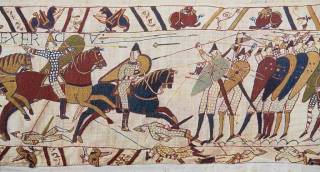
1066 is one of the most well-known dates in British history, etched into the public psyche. But do we fully understand one of our nation’s most defining moments? Supported by a Leverhulme Trust Research Fellowship (2021-22), Dr Erin Goeres (UCL School of European Languages, Culture and Society) will explore the repercussions of this momentous year in the literatures of England, Normandy and – perhaps surprisingly – Scandinavia. The project will reveal how writers in all three regions celebrated their common heritage and mourned the wars that brought their people into conflict. Drawing on studies of collective memory and trauma, the research will reveal the far-reaching cultural ramifications of the Conquest, not only in England itself but across the northern world.
Memory – Identity – Rights in Records – Access: Embedding Participatory Recordkeeping in Child Social Care

At present recording and recordkeeping systems in child social care settings in England are oriented towards the needs of service providers, with a focus on risk management, mandatory reporting to central government and the needs of social workers. As a result, the voices, and feelings of looked after children, carers and families are often missing or obscured. Systems are also proprietary, procured from commercial providers, and are rarely interoperable with the software from competing vendors used in adjacent services (such as health, education, or youth justice), making the information they contain difficult to share. They can only be accessed by a limited number of individuals, exacerbating a work culture which sees the record as internal, administrative, and bureaucratic.
This project builds on the results of an earlier AHRC-funded two-year project, ‘Navigating the Public Information Rights Ecology’, which was co-produced with the project’s third sector partners, The Care Leavers’ Association. The research demonstrated that records are a vital resource for other stakeholders, most especially the care experienced person themselves, in understanding the circumstances of someone’s life.
Children in care and care leavers have a deep personal and emotional need for records to help construct life narratives and a sense of self. Transparency and equity in recordkeeping therefore has significant potential to increase their wellbeing and sense of belonging. Using participatory recordkeeping systems would enable the child in care to be more actively involved in the creation and management of the records that document their lives. However, implementation of participatory recordkeeping practices is currently hindered by the lack of appropriate enabling software on the market.
This follow-on project engages with OLM, a major vendor in the social care systems market, to use the findings of the previous research as the basis for the development of the specification required to support the development of a commercially available participatory system. Together, UCL and OLM will test the concept of a system that aligns with the project team’s recommendations, and that can embed our framework for participatory, equitable and just social care recording into the digital tools used in children’s social care settings.
The project team is led by Prof Elizabeth Shepherd (UCL Information Studies) and Dr Anna Sexton (UCL Information Studies) and supported by AHRC Follow-on Funding for Impact and Engagement (2020-21).
Compromised Identities? Reflections on perpetration and complicity under Nazism
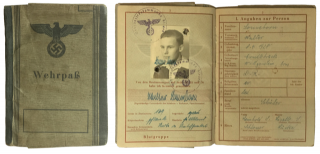
Under Nazi rule, millions were involved in the machinery of persecution. In 2015, the UK’s Holocaust Commission noted that, while the Holocaust could only be carried out ‘with widespread complicity’, there is ‘a great deal of education on perpetrators’ roles, but not enough on the role of society and bystanders. This statement reflects both the character of public education and the current state of research. Yet the category of ‘bystanders’ is too broad to encapsulate the ambiguities of a wide range of behaviours variously motivated by conviction and careerism, conformity and passivity, partial enthusiasm, or self-distancing, as well as capitulation rooted in fear and powerlessness.
This interdisciplinary project analyses how people became entangled in Nazi systems and practices, and how they responded to what later, under different circumstances, came to be seen as a ‘compromised’ past. Exploring perpetration and complicity in state-sponsored violence and questions of justice in its aftermath, it focuses on representations by and of people ‘on the perpetrator side’ from the Third Reich to the present.
The project examines ways in which people who were involved in or witnesses to Nazi crimes talked about, silenced, or variously negotiated accounts of their roles, often constructing retrospective accounts of having been merely an ‘innocent bystander’. It analyses how individual identities come under pressure when circumstances and value systems change, and how self-representations develop over time. It explores how public discourses – political, cultural, journalistic, and judicial – address state-sponsored violence and interrogate or contribute to exculpatory strategies at a personal level.
This three-year project is led by Prof Mary Fulbrook (UCL School of European Languages, Culture and Society) and Prof Stephanie Bird (UCL School of European Languages, Culture and Society) and funded by an AHRC Research Grant (2018-21).
 Close
Close

